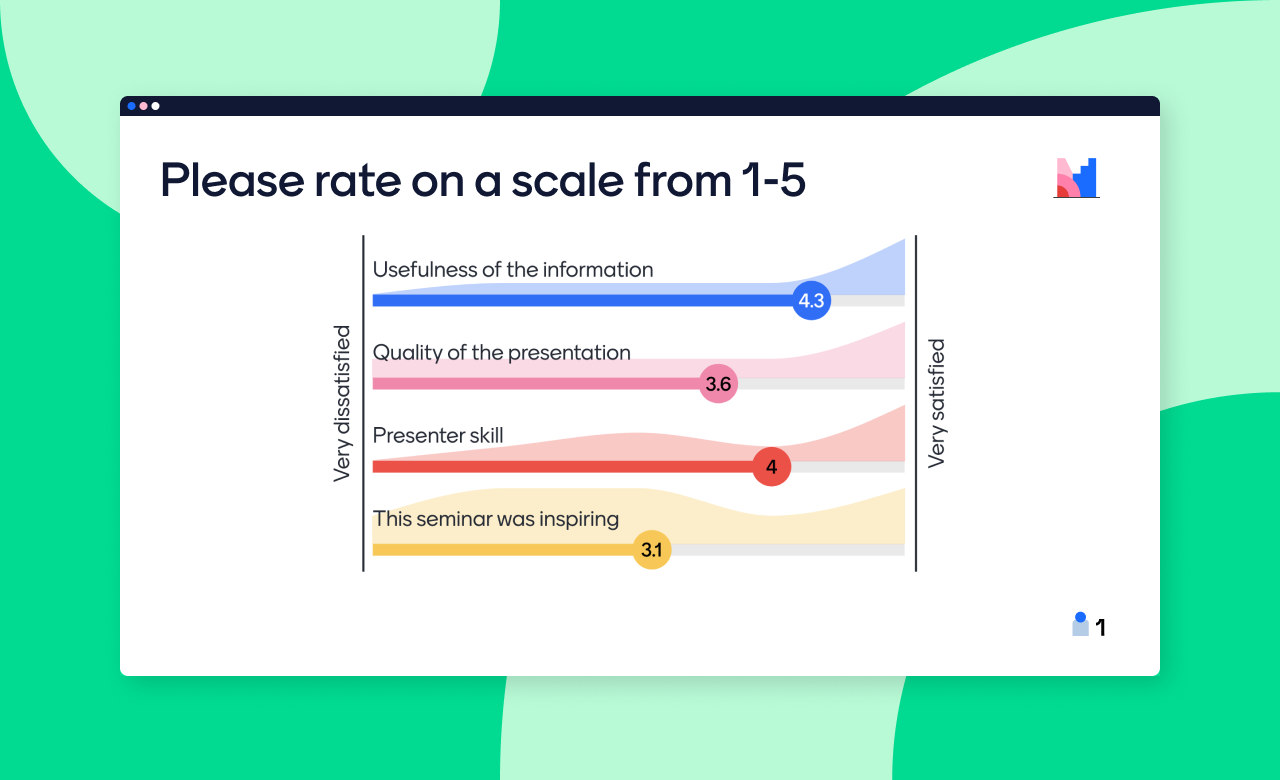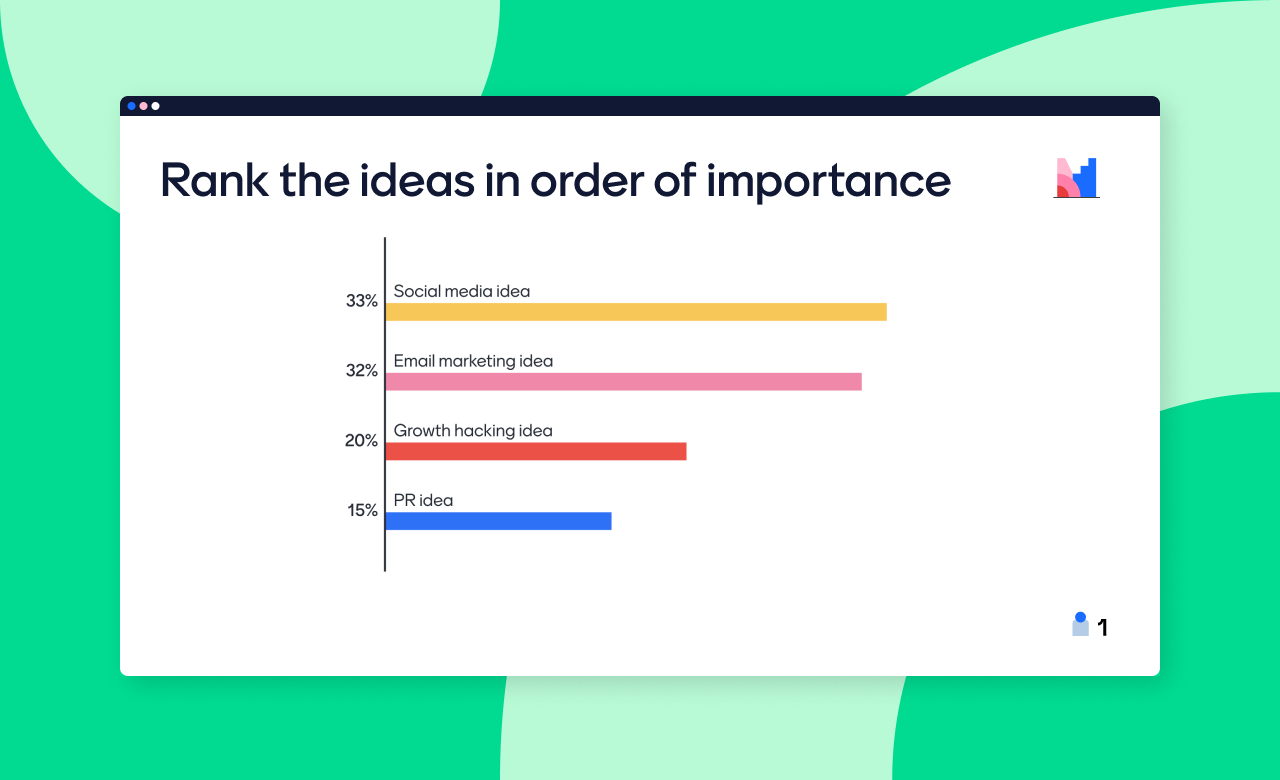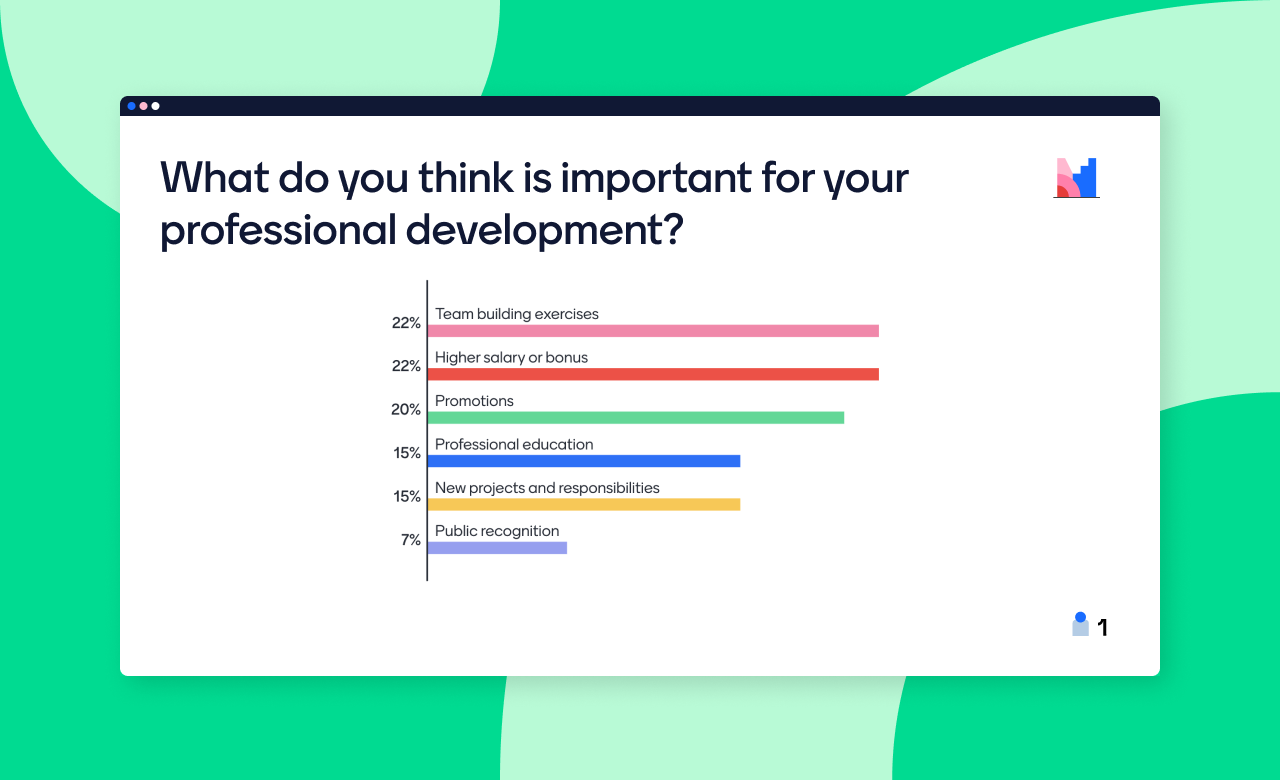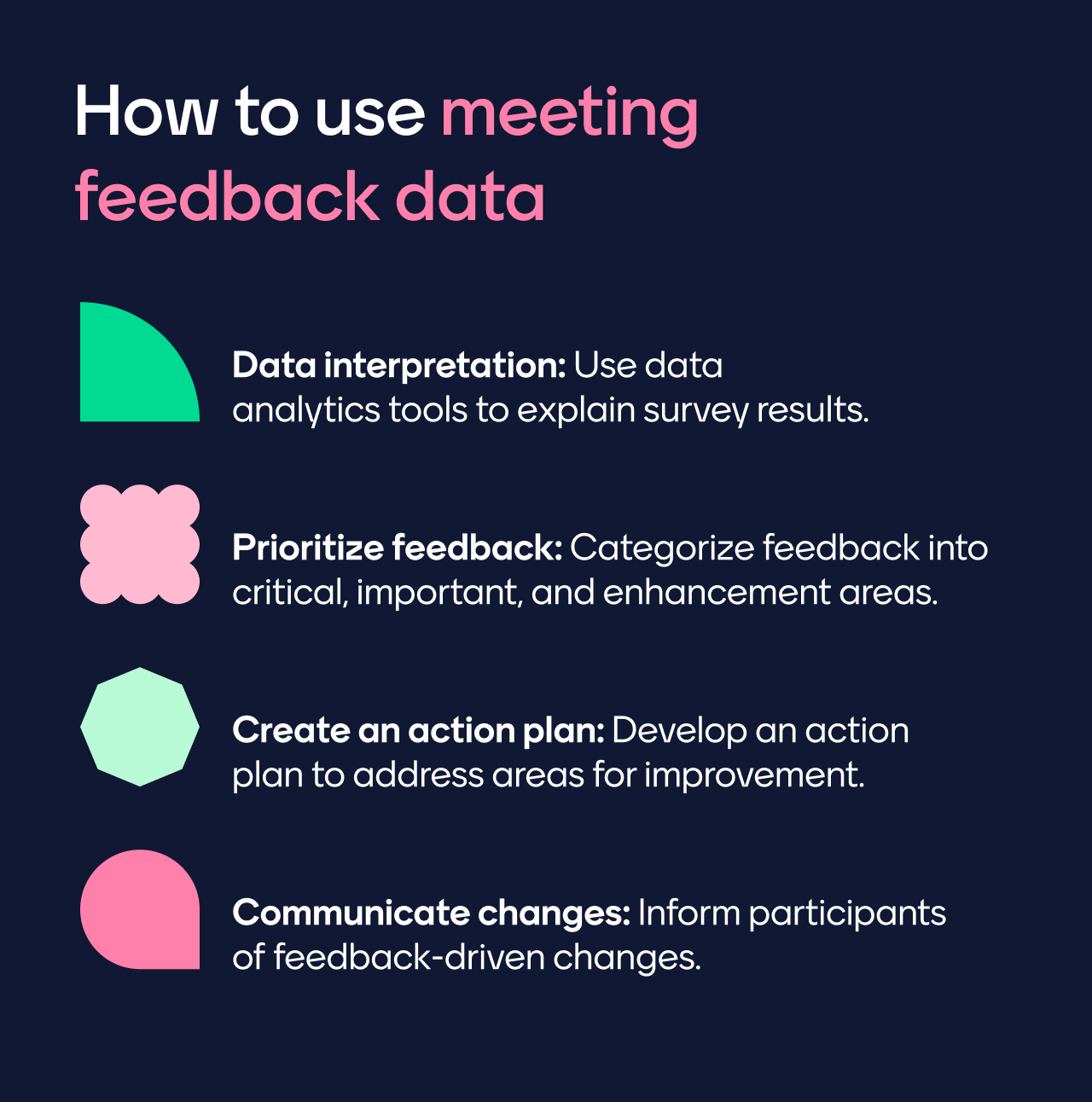
What separates the best team leaders, presenters, and educators from the rest? They’re always looking for ways to kick their strategy up a notch. That’s why post-meeting feedback is a game-changer.
Participant feedback and unique insights are a gold mine for finding ways to make future meetings even better. In this piece, we’ll cover the kinds of post-meeting survey questions you should be asking, plus our best tips for handling, dissecting, and putting feedback into practice.
Itching to get started? Download our post-meeting survey template for ideas on gathering opinions and constructive feedback from your latest meeting.
General meeting feedback questions
If you need to whip up a snappy meeting evaluation survey, start with these questions. While they’re meant to be short and sweet, general post-meeting feedback can give you valuable insight on:
- Participant satisfaction: Did your presentation soar or fall flat? Knowing this can help you dial in on expectations.
- Key strengths: What specifics made participants nod their heads or break into applause? Zoom in on these superhero moments so you can tailor them for future meetings.
- Communication: Was it smooth sailing or a bit choppy? Assessing the clarity of key messages and objectives ensures you’re firing on all cylinders for the next big meeting.
Oh, and here’s a tip: Mix it up! Throw in a combo of closed-ended questions (you know, scales or multiple-choice Q’s) for quick, quantifiable data. But don’t sleep on open-ended questions — they’re your secret weapon for diving deep and catching any unexpected hiccups.
General meeting feedback question examples:
- On a scale of 1 to 5, how satisfied were you with the overall meeting experience?
- What aspects of the meeting did you find most valuable?
- How would you rate inclusivity and collaboration during the meeting?
- Were the key messages and objectives clear and well communicated?
- Did the meeting cover the topics you expected?
- How would you rate the overall format and pace of the meeting?

Meeting environment questions
Believe it or not, the stage you set for your meeting plays a big role in how engaged, satisfied, and inspired your participants are. Asking targeted post-meeting questions about the meeting environment helps you gauge:
- Inclusivity and collaboration: Did your participants feel seen and heard throughout the meeting? You want to make sure you’re creating a safe space where everyone feels like they belong.
- Participant comfort: It’s not just about cushy chairs; it’s about making sure everyone’s emotionally comfortable in the meeting space. Because when they’re comfortable, engagement and focus skyrocket.
- Team dynamics: How’d the vibe in the room contribute to that positive team spirit? Understanding your meeting environment helps you foster open communication and knowledge among your crew.
These questions are your ticket to uncovering the not-so-tangible magic of your meetings. Take these insights and weave them into your future setups to create an environment that sparks killer discussions and unmatched collaboration.
Meeting environment question examples:
- How would you rate overall inclusivity and collaboration during the meeting?
- Were there any aspects of the meeting environment that positively or negatively influenced your engagement?
- Did you feel comfortable expressing your thoughts and opinions during the meeting?
- Were there any factors in the physical or virtual space that enhanced or hindered your participation?
- How would you describe the overall atmosphere of the meeting room or virtual platform?
- Were there any challenges in the meeting environment that could be addressed for future meetings?
Meeting effectiveness questions
Meeting effectiveness questions go beyond asking how satisfied everyone is — they aim to measure the real impact of the meeting. These questions peel back the layers of:
- Objective achievement: Did the meeting hit the bullseye on its goals? Check that your team isn’t just meeting for the sake of it but crushing organizational goals and making real strides.
- Content relevance: How on-point was the meeting content? Understanding its impact helps you fine-tune future discussions, making sure they hit the sweet spot for your team's needs and expectations.
- Participant engagement: A meeting is an opportunity for everyone to contribute. Did the meeting spark engagement? It should have! Active participation is the name of the game.
By digging into meeting effectiveness, organizers can spot areas for improvement, tweak agendas, and make sure each meeting contributes to organizational goals.
Meeting effectiveness question examples:
- To what extent did the meeting address its stated objectives?
- Were the key messages and objectives clear and well communicated?
- Did the meeting cover the topics you expected, and were they relevant to your role or responsibilities?
- How would you rate the overall effectiveness of the meeting in achieving its intended outcomes?
- Did the meeting provide actionable insights or solutions to the challenges discussed?
Content relevance questions
Let’s face it — no one’s thrilled about sitting through meetings that dance around the objective or take scenic detours off-topic. Enter the content relevance questions, laser-focused on making sure your meeting hits the bullseye on:
- Alignment with expectations: Did the meeting content meet the expectations you set? This isn’t just about ticking boxes; it’s about organizing future gatherings with a clear purpose.
- Job role alignment: How relevant was the content to each participant’s role? We're talking about customizing discussions to fit the unique responsibilities within your team. One-size-fits-all? Not in our playbook.
- Engagement and understanding: Relevant content isn’t just background noise; it's the main act. It grabs attention, sparks engagement, and turns your meeting space into a productivity hub.
By peeking into the perceived value of the content post-meeting, you're basically gearing up to be the maestro of future meeting agendas. Tailor them not just to meet expectations — but to exceed them.
Content relevance question examples:
- Did the meeting cover topics relevant to your job role or responsibilities?
- How would you rate the relevance and importance of the content/ideas presented during the meeting?
- Did the meeting address challenges or topics that are currently significant for the team or organization?
- Were there specific agenda items you found particularly relevant or irrelevant?
- To what extent did the meeting provide insights or information that will contribute to your work moving forward?

Employee engagement questions
Employee engagement questions break down the involvement, excitement, and connection your team felt during the meeting. These questions act as a compass to guide you through:
- Engagement levels: How tuned in were your participants? Understanding this gives you the full picture of their satisfaction with the meeting.
- Engagement strategy success: Ever wonder what magic tricks keep participants on the edge of their seats? These questions unveil the secrets. Identify and replicate engagement strategies that work like a charm, whether they’re killer icebreakers or interactive Q&A sessions.
- Team collaboration: Engaged participants don't just sit back; they roll up their sleeves and dive into discussions. That's key for a meeting culture that’s all about collaboration and inclusivity.
If you're aiming for meetings that are dynamic, interactive, and collaborative, understanding what makes folks tick is important. Pinpoint the roadblocks, uncover the gems, and crack the code to better engagement.
Employee engagement question examples:
- How engaged did you feel throughout the meeting?
- Were the activities or techniques used to maintain engagement effective?
- Did you feel there were ample opportunities for participation and interaction?
- Were there specific moments during the meeting that particularly captured your attention?
- On a scale of 1 to 5, how connected did you feel to the topics discussed and the overall meeting environment?
Want to hone in on what your employees value most? Try our employee engagement survey template:
Speaker evaluation questions
Very few people are natural-born speakers. It takes practice to learn how to hold an audience’s attention, drive the conversation, and still cover all the information needed. That’s why speaker evaluation questions are essential for recognizing the presenter’s strengths and finding areas for improvement. This feedback can help gauge:
- Quality of delivery: How smoothly do speakers present their content? This helps you set the bar high, ensuring top-notch presentation styles and effectiveness.
- Communication skills: It's not just about talking; it's about effectively conveying complex topics. This contributes to crystal clear understanding and better knowledge retention for future meetings.
- Engagement effectiveness: How well do speakers hold the audience's attention? Evaluating this can help you identify what works and what doesn’t.
These questions give you the power to spot exceptional facilitators, give constructive feedback, and level up the overall quality of presentations in future meetings.
Speaker evaluation question examples:
- How would you rate the overall quality of the speakers/presenters?
- Were the speakers effective in delivering key messages and information?
- Did the speakers demonstrate a clear understanding of the topics presented?
- On a scale of 1 to 5, how engaging were the speakers during their presentations?
- Were the speakers able to hold your interest throughout their presentations?
- What suggestions do you have for improving the speaker’s delivery or style?
Career and skill development questions
Career and skill development questions in post-meeting feedback measure how well the meeting aligned with participants' professional growth. These questions help you understand whether your meeting played a role in:
- Learning opportunities: Did the meeting open doors for new knowledge and skill development? This is the key to tailoring future meetings that truly support the growth of your participants.
- Enhancing skill sets: How did the meeting contribute to sharpening specific skills? Make sure participants leave with concrete takeaways that directly benefit their roles.
- Individual growth: How did the meeting impact each person's professional journey? This can help you understand the unique role meetings play in the ongoing development of your participants.
By regularly gauging career and skill development, you’ll have the knowledge to craft meetings that become milestones in your team members’ career paths.
Career and skill development question examples:
- Did the meeting contribute to your personal and professional development?
- Were there clear opportunities for learning and skill development during the meeting?
- What specific insights or skills did you gain from the meeting?
- How can future meetings better support your professional growth?
- Did the meeting provide actionable insights that will positively impact your career?

Why you should collect post-meeting feedback
Meetings aren’t just about sharing info or tossing ideas around. They set the stage for strengthening collaboration, coming up with innovative solutions, and launching careers to new heights.
You may believe you ticked off all the boxes during your presentation, but if you aren’t collecting meeting feedback, how would you really know if your meeting hit home?
Understanding the strengths and weaknesses of each meeting through participant feedback allows you to make data-driven decisions on how to make the next meeting even better.
Post-meeting feedback also helps cultivate a culture of transparency and open communication within your team — both essential for fostering collaboration.
How to analyze and act on feedback

It’s not enough to just collect meeting feedback — you actually need to turn those insights into action. Here’s how to transform post-meeting feedback into tangible changes:
- Data interpretation: Dive into the feedback results using nifty tools like Mentimeter’s export and analysis feature. Uncover patterns, spot trends, and pinpoint areas that need a little extra love.
- Prioritize feedback: Don't let the sea of comments overwhelm you. Categorize them into critical, important, and opportunities for improvement to zero in on the changes that'll have the most impact.
- Create an action plan: A good action plan isn’t just a wishlist — it’s a roadmap. Assign responsibilities, set deadlines, and craft strategies to tackle the issues head-on.
- Communicate changes: Let your team in on the changes and share how their feedback influenced your meeting space for the better.
Best practices for meeting feedback surveys
Unlocking the full potential of meeting feedback surveys requires a strategic approach. To help you get started, we put together our best practices and tips to make your surveys sing:
- Timing and frequency: Don't let those fresh impressions fade away. Administer your surveys shortly after a meeting, ideally within 24-48 hours.
- Effective questions: Avoid a one-size-fits-all approach. Tailor your questions to match the vibe of your audience. Throw in a mix of quantitative and qualitative questions for a 360-degree view.
- Anonymity and confidentiality: This one’s important. Let your participants spill the beans without any fear of repercussions.
- Delivery and ease of use: Taking a survey shouldn’t require pulling teeth. Use a user-friendly platform like Mentimeter to encourage active participation and honest responses. Because when it’s easy, more voices join the chorus.
Run effective post-meeting feedback surveys with Mentimeter
Virtual feedback tools like Mentimeter make the whole survey process a breeze for both you and your participants. With Mentimeter’s innovative, user-friendly interface, participants can share their thoughts in real time while you effortlessly gather, analyze, and turn that feedback into action.



